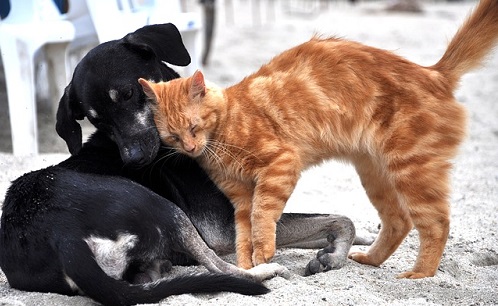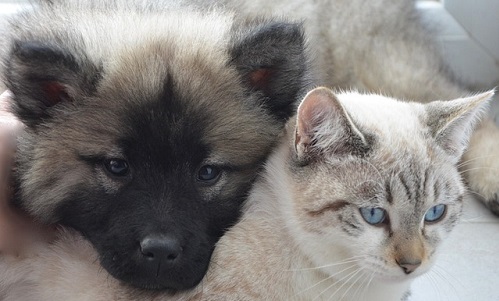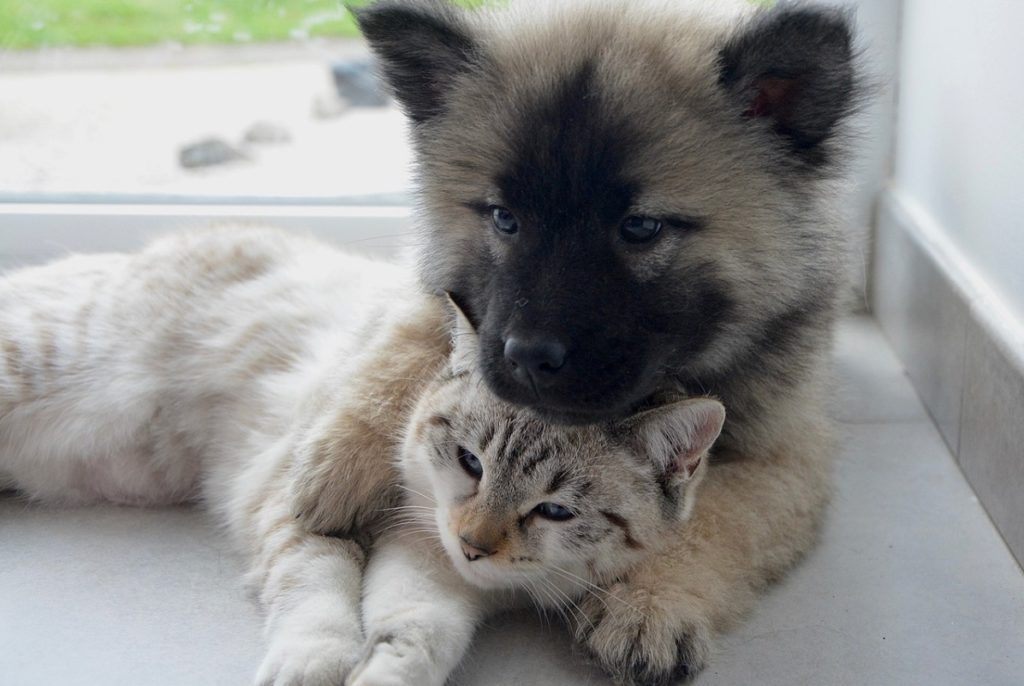Did you know that allergies can affect not only you but also your pets? If you’re a dog owner, you may be surprised to learn that your dog can be allergic to different ingredients in their food or environmental stimuli, just like you! But what about allergies to other animals? Surely you’ve seen the effects of pet allergies on human beings, but can dogs be allergic to cats as well?
The answer is yes. Heck, dogs can even be allergic to other dogs. While it is uncommon, dogs can be allergic to cat dander and saliva, and cats can be allergic to dog dander and saliva. To understand how and why this allergy occurs, it is important to first discuss the basics on dog allergies, the odds of having a dog who is allergic to your cat, and how you can manage a pet-to-pet allergy.
The Basics on Dog Allergies
 Allergies occur as a result of your dog’s immune system reacting to a foreign substance it has encountered. There are a number of different allergies that your pup can suffer from, such as canine food allergies, skin allergies, and/or environmental allergies. If your dog is allergic to your cat, that falls under the umbrella of environmental allergens. Below is a brief overview of each of these three types of allergies.
Allergies occur as a result of your dog’s immune system reacting to a foreign substance it has encountered. There are a number of different allergies that your pup can suffer from, such as canine food allergies, skin allergies, and/or environmental allergies. If your dog is allergic to your cat, that falls under the umbrella of environmental allergens. Below is a brief overview of each of these three types of allergies.
- Food Allergies: Food allergies occur when your dog eats a certain food and it triggers an immune response that can cause a number of side effects ranging from hives on dogs, facial swelling, itchiness, vomiting, and/or diarrhea. In some cases, anaphylaxis can occur due to a severe allergic reaction. It’s important to keep in mind that these are what are considered “true allergies”. Many dogs possess food sensitivities, which some pet owners may mistakenly classify as a food allergy. The difference between an allergy and a sensitivity is that a sensitivity does not trigger an immune response.
- Skin Allergies: Skin allergies are also classified as allergic canine dermatitis, which means an inflammation of the skin due to an allergy. The three primary causes of skin allergies are food allergies, environmental allergens, and flea allergy dermatitis. Flea allergy dermatitis occurs when your dog has an allergic reaction to flea bites due to their saliva.
- Environmental Allergens: Environmental allergens can be a range of potential causes, such as dust, pollen, and mold, which are typically seasonal allergens. However, if your dog is allergic to your cat, it is reacting to the cat dander or saliva in their environment. Dander is made up of tiny cells that are dropped from the hair and fur.
Symptoms
If you think your dog may be allergic to your cat, it is important to monitor their behavior and be aware of any symptoms they develop. Below are a handful of the most common symptoms your dog may exhibit if they are allergic to your cat.
- Ear discharge
- Red, itchy skin
- Unusual odors (this is generally due to the development of a secondary infection caused by the allergies)
- Constant licking (particularly over a large area of their body)
- Hair loss
- Coat discoloration
- Rubbing of the face on rough surfaces or carpet
If your dog is exhibiting any of these symptoms, it is important to visit a licensed veterinarian so they can perform a complete physical examination on your dog and prescribe the right course of treatment for his symptoms.
The Likelihood Your Dog is Allergic to Your Cat
Now that you know your dog can be allergic to your cat, you may be wondering how likely it is that he is allergic. Thankfully, it is relatively rare for a dog to develop allergies based on cat allergens in their environment. The only way to truly diagnose this type of allergy is if a veterinarian runs an allergy test to see which allergens your dog is allergic to.
Managing a Dog-to-Cat Allergy
 If you discover your dog is a part of the small percentage who react to cat allergens, it is important to consider how you are going to manage the situation. No pet parent wants to have to think about giving away an animal they love, but for some, that may have to be a consideration depending on the severity of the allergic reaction. However, there are other options for resolving the situation. Since your dog is reacting to the cat dander and/or saliva in their environment, by vigilantly ridding the household of cat dander as frequently as possible, it is possible for your dog and cat to still coexist happily and peacefully, allergies and all.
If you discover your dog is a part of the small percentage who react to cat allergens, it is important to consider how you are going to manage the situation. No pet parent wants to have to think about giving away an animal they love, but for some, that may have to be a consideration depending on the severity of the allergic reaction. However, there are other options for resolving the situation. Since your dog is reacting to the cat dander and/or saliva in their environment, by vigilantly ridding the household of cat dander as frequently as possible, it is possible for your dog and cat to still coexist happily and peacefully, allergies and all.
To manage cat dander, you will likely need to increase the frequency that you bathe your cat up to one a week. In addition, you will also need to vacuum daily to clean cat hair and dander off the carpet, furniture, floors, draperies, and any other surfaces in the home. Air purifiers may also be beneficial in helping to battle cat dander. In addition to these environmental changes, you can also discuss potential treatment options with your veterinarian that may reduce your dog’s allergy symptoms.
Sources:
“Can Your Dog or Cat Be Allergic to You?” National Geographic, 11 Apr. 2015, Accessed 4 Dec 2018. https://news.nationalgeographic.com/2015/04/150411-dogs-cats-allergies-science-pets-animal
Ryan, Maureen. “Can a Dog Be Allergic to a Cat?” PetCareRx, Accessed 4 Dec 2018. www.petcarerx.com/article/can-a-dog-be-allergic-to-a-cat/1591.
Burke, Anna. “Dog Allergies: Symptoms and Treatment – American Kennel Club.” American Kennel Club, 24 Aug. 2017, Accessed 4 Dec 2018. www.akc.org/expert-advice/health/dog-allergies-symptoms-treatment/.
“Can Dogs Be Allergic to Cats? The Cause Of Your Pup’s Sniffles!” K9 Of Mine, 2 Oct. 2018, Accessed 4 Dec 2018. www.k9ofmine.com/can-dogs-be-allergic-to-cats/.




